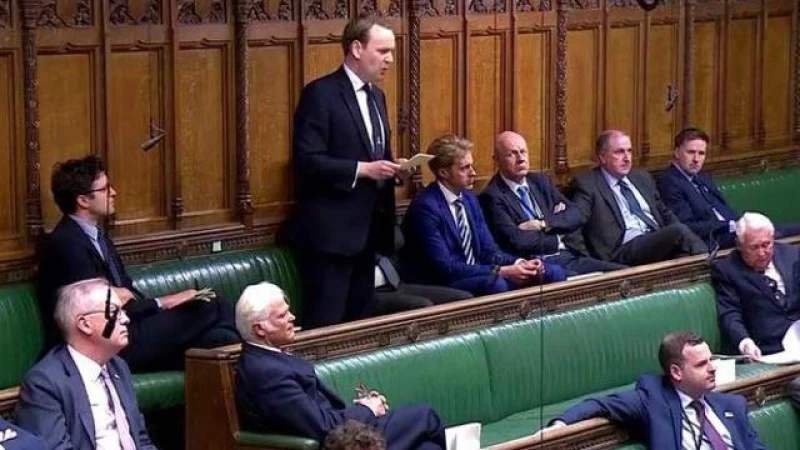London — An investigation has been launched by British police into explicit messages sent to a lawmaker as part of an alleged sexting scam targeting legislators, marking the latest cybersecurity scare to impact parliament. Conservative member of Parliament William Wragg admitted late Thursday that he had shared the personal phone numbers of several colleagues with an individual he met on a gay dating app.
Wragg, aged 36, disclosed to The Times newspaper that he did so under duress, as the recipient claimed to possess compromising material about him.
"I was anxious because he had information on me. He provided me with a WhatsApp number, which is no longer active," stated the Conservative party MP, who is stepping down at the upcoming election.
"I have caused harm by being vulnerable. I was frightened. I am deeply ashamed," he expressed.
The incident has been labeled as a "spear phishing" attack, where seemingly trustworthy sources obtain personal or confidential information.
The Chancellor of the Exchequer of Britain, a key cabinet member responsible for the nation's finances, stated that the allegations of a cyberattack against Wragg were "a significant cause for worry."
Jeremy Hunt commended Wragg for offering what he described as "a courageous and fulsome apology," emphasizing the importance of cybersecurity for all MPs and the public. Hunt highlighted the need for caution in dealing with cybersecurity issues, stating that it is a challenge faced by everyone in their daily lives.
Accusations of Cyberattacks on U.K. Linked to China
In a recent development, the U.K. government raised concerns about a series of cyberattacks, including those targeting MPs, by summoning China's top representative in London. This action follows previous allegations of espionage by Beijing against lawmakers.
As reported by The Times, two MPs received explicit personal photos in response to the initial message sent to them.
Charges Filed Against Chinese Hackers by U.S. Authorities
The disclosure of phishing attacks on British parliamentarians surfaced shortly after the U.S. Justice Department announced charges against seven Chinese individuals associated with a state-backed group. The accused were charged with targeting U.S. businesses, political figures, candidates, and campaign staff to advance the Chinese government's objectives related to economic espionage and foreign intelligence.
"The Chinese government's actions highlight their willingness to use cyber operations to target and intimidate critics, posing a threat to the national security of the United States and our allies," stated Attorney General Merrick Garland.
- FBI chief warns Congress of Chinese hackers targeting U.S. infrastructure
While officials in Britain reported phishing attacks with sexual messaging, the recent prosecutions in the U.S. revealed a hacking scheme that involved sending emails appearing to be from news outlets or journalists. These emails contained hidden phishing links that would transmit information to a server controlled by the alleged hackers.
According to officials, targets of the scheme included White House staff, federal agencies, members of Congress from both parties, and even their spouses. Deputy Attorney General Lisa Monaco explained that the operation involved "over 10,000 malicious emails, impacting thousands of victims, across multiple continents."
Today's indictment claims that a widespread hacking campaign, supported by the PRC government, focused on silencing critics of the Chinese regime, infiltrating government bodies, and pilfering valuable trade secrets by targeting journalists, political figures, and businesses.







